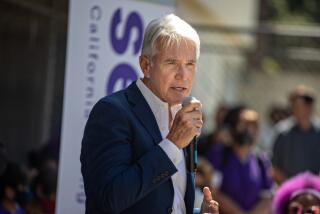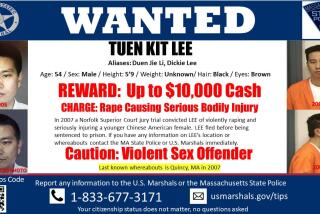Conviction of Lawyer in Cocaine Case Overturned
- Share via
In a precedent-setting decision, a state appellate court has reversed the cocaine possession conviction of Stephen Terrill Lee, a former North County attorney whose career was derailed by drug charges and allegations that he sought the murder of a government informant.
The ruling this week by the 4th District Court of Appeal says it is illegal for police to arrest an individual in his private business office without a warrant, extending a protection that had been limited to arrests at home, according to Lee’s attorney, Douglas Grinnell.
The decision does not affect Lee’s 1984 conviction on a charge of using force to dissuade the informant from testifying against him. He already has been been paroled from a two-year, eight-month prison sentence on the convictions.
Deputy Atty. Gen. Pamela Ratner, who argued the case on appeal, termed the ruling “surprising” and said prosecutors would seek a rehearing by the appellate judges and review, if necessary, by the state Supreme Court.
“We’d set up dominoes one right after another,” she said. “It sounds like the court knocked every single one over.”
Police arrested Lee in his Vista law office in April, 1982, after he allegedly sold an informant half an ounce of cocaine for $1,200. He eventually was acquitted of drug sales charges; the jury concluded he had been entrapped.
But the same jurors found Lee guilty of possessing cocaine--a charge that stemmed from his attempt to throw away a vial of the drug at the sheriff’s station in Vista after his arrest.
The jury deadlocked on a charge that Lee had solicited the murder of Keith Way, the police informant in the alleged cocaine sale. Before he could be retried on that allegation, however, Lee pleaded no contest to the lesser charge of using force to discourage Way’s testimony.
Now, the appellate court has ruled that the conduct of the joint federal-local Narcotic Task Force in arresting Lee was a violation of his constitutional right to protection from unreasonable seizure.
According to the court’s ruling, plainclothes officers entered Lee’s office as soon as Way emerged from completing the cocaine purchase. Without waiting to be announced by the lawyer’s secretary, they knocked on his door and attempted to open it, but found it locked. The secretary then opened the door. Without conversation, the officers walked in and arrested Lee.
Basing their decision on a series of recent federal court rulings, the appellate judges concluded that Lee “had a reasonable expectation of privacy in his locked interior office, which was not accessible to the public without his permission.”
Rulings by the California Supreme Court and the U.S. Supreme Court over the last 10 years have established that police cannot arrest a person at home without a warrant or the person’s consent, except under unusual circumstances demanding immediate action.
Other decisions, meanwhile, have held that property and records cannot be seized from business offices not generally accessible to the public, again unless there is a warrant or the consent of the business.
Weaving those and other rulings together, Justice Don R. Work held that the same protection against arrest should be afforded to individuals in their private offices. Justices Howard B. Weiner and Gerald J. Lewis concurred in the decision.
Because Lee’s arrest was illegal, the court ruled, the cocaine possession conviction stemming from his conduct after the arrest must be thrown out.
The judges noted that, at Lee’s trial in Vista Superior Court, no ruling was made on whether the circumstances of the arrest were extraordinary enough to justify police entering the office without a warrant.
Grinnell said Thursday that it appeared the appellate court was inviting the state Supreme Court to order further hearings on that question--a step that could ultimately lead to the reinstatement of Lee’s conviction.
If the appellate court’s ruling stands, however, Grinnell said it offered a significant expansion of privacy rights.
“This case is an extension of constitutional law, and it seems almost to be going against the judicial trend to limit individual protections,” he said.
More to Read
Sign up for Essential California
The most important California stories and recommendations in your inbox every morning.
You may occasionally receive promotional content from the Los Angeles Times.












